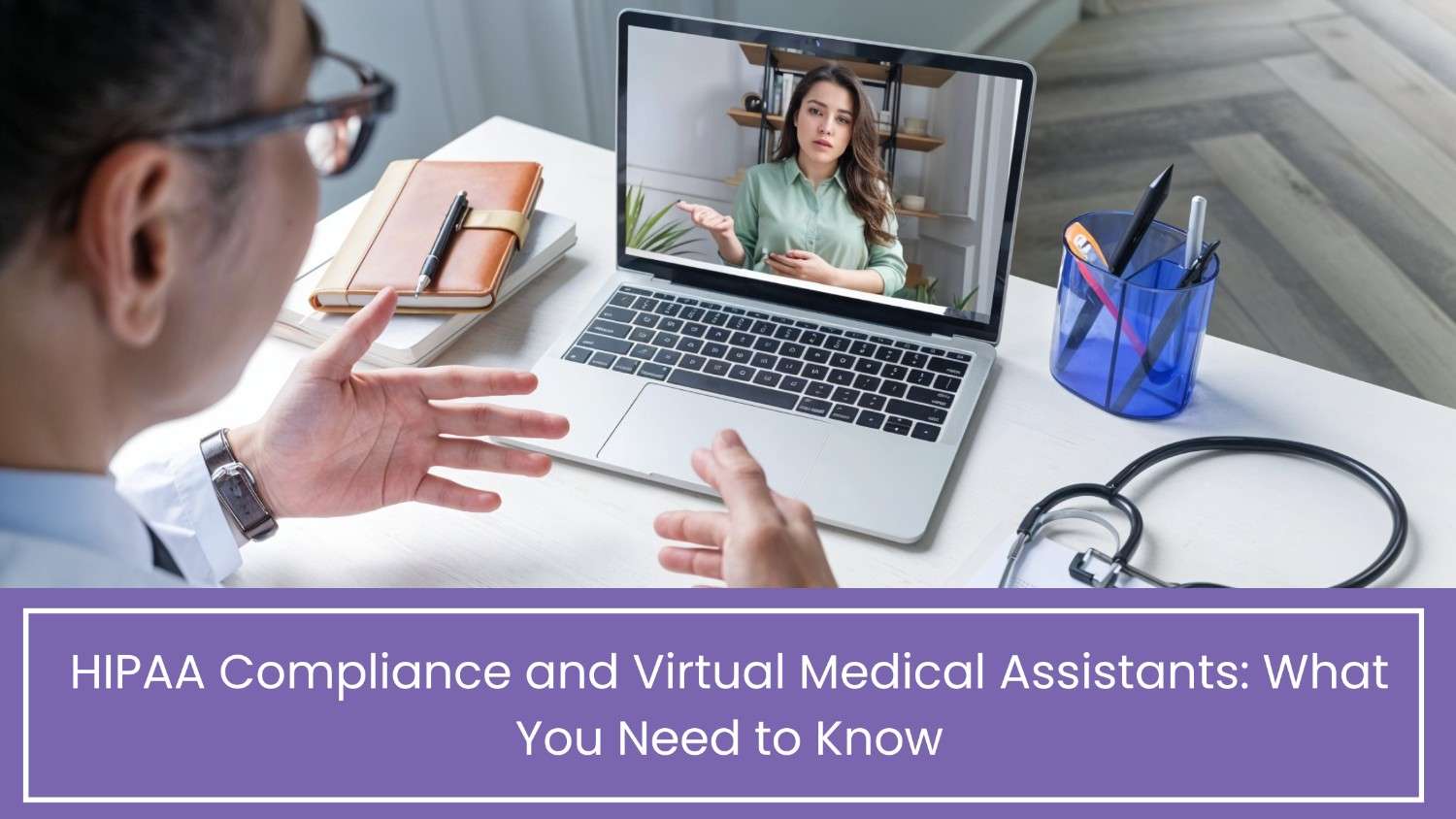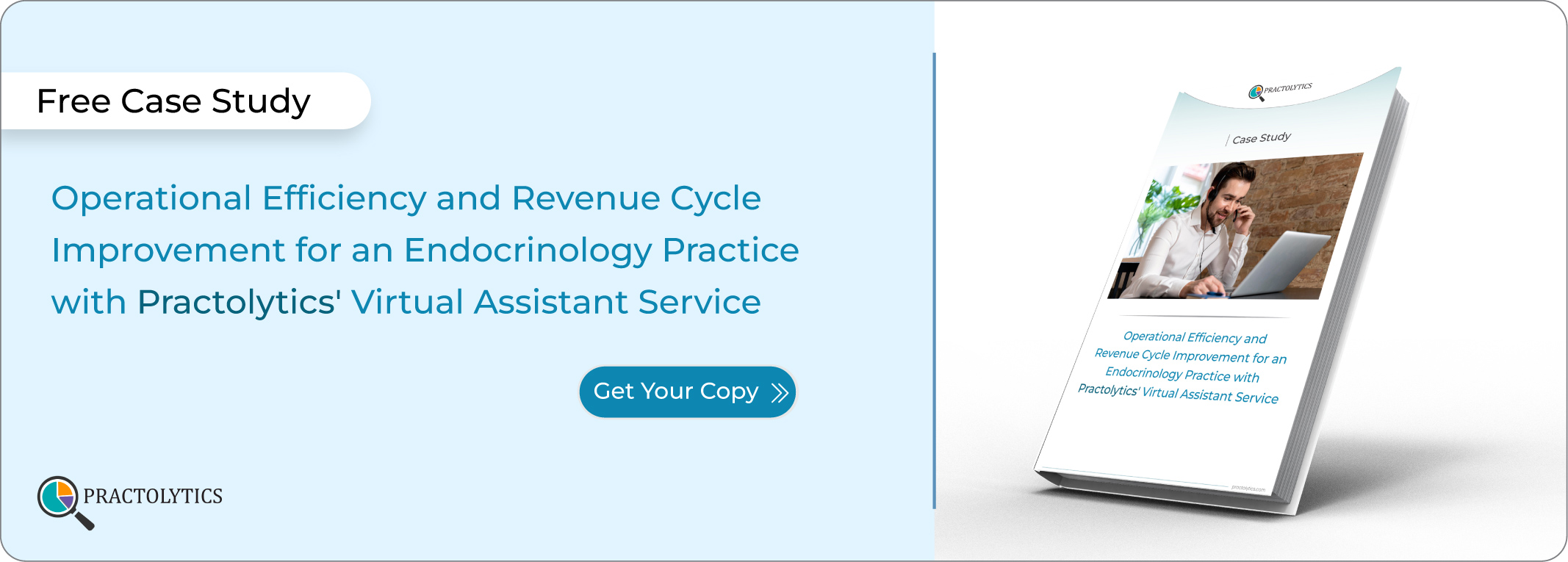HIPAA Compliance and Virtual Medical Assistants: What You Need to Know
By taking care of essential tasks such as scheduling, billing, and patient communication, virtual medical assistants (VMAs) are streamlining operations and revolutionizing the healthcare industry. However, with this increased efficiency comes the serious responsibility of safeguarding confidential patient information. That’s where HIPAA compliance and virtual medical assistants become critically intertwined. This blog explores how to ensure your practice remains compliant while leveraging the benefits of VMAs. From using secure platforms and executing proper Business Associate Agreements (BAAs) to avoiding common compliance pitfalls, you’ll gain a clear understanding of best practices. Learn why more providers are choosing HIPAA-trained VMAs and how Practolytics supports clinics in staying efficient, patient-centered, and fully compliant. Whether you’re currently using VMAs or considering them for the future, this guide will help you stay both smart and secure.
Table of Contents
HIPAA Compliance and Virtual Medical Assistants: What You Need to Know
Virtual medical helpers, also known as VMAs, are now a big part of healthcare. They handle jobs such as
- Setting up when patients see the doctor
- Taking care of bills and money stuff for health
- Talking to patients
- Keeping patient records up to date
VMAs are like extra hands for doctors. They save time and make sure there are fewer. This lets healthcare providers focus more on patient care enhancement.
Let’s move on to a topic that is crucial to our sector: protecting private health information. We’re talking about HIPAA, a crucial regulation intended to protect private patient data.
We will explain in this blog post,
- How HIPAA works with VMAs
- What risks might come up
- Ways to keep your medical business safe
Read on to find out how to use VMAs without worrying about breaking the rules or upsetting your patients.
Why Virtual Medical Assistants Are Becoming Popular
Healthcare is moving fast, and many offices are using virtual assistants now. Here’s the deal:
They save money on hiring people and paperwork.
- They make sure bills and files are right more often.
- They help patients get seen and taken care of better.
- They’re available outside regular hours, even 24/7
Important fact: In just two years, healthcare places using virtual helpers went up over 30%, and it’s not stopping.
What is HIPAA?
One important law in the healthcare industry is HIPAA. It functions similarly to a chief supervisor, keeping an eye on how we handle private patient data, including names, numbers, medical records, and insurance details. It all comes down to protecting these bits of information so that nobody gets into trouble.
This law is like a strict guardian for any place that deals with people’s medical information. If you don’t play by its rules, it can cause a world of pain for your business, like having to pay a lot of money and fixing a messed-up reputation. Plus, patients might not trust you anymore if you don’t keep their info safe. So, always remember to treat their medical staff with the utmost care and confidentiality. It’s like a golden rule in the health business.
How HIPAA Affects Virtual Medical Assistants
A VMA may encounter personal health information while helping with invoicing, appointment scheduling, or patient communication. They must pay close attention to the HIPAA regulations. Here is a basic road map to assist them:
- Use secure tools. To protect patient information, outfit your virtual medical assistant (VMA) with HIPAA-compliant technology, such as encrypted email and robust password-protected cloud services.
- Have a clear agreement: Your VMA is a business partner if they are not a direct employee. Obtain a signed Business Associate Agreement (BAA) attesting to their commitment to protecting private health information.
- Give appropriate training. Make sure your VMA is well-versed in HIPAA so they can handle any security issues that may come up and manage private health information.
Common HIPAA Mistakes with Virtual Medical Assistants
Many small offices sometimes trip over basic stuff that can cost them big bucks. So, let’s keep an eye out for these blunders:
- Forgetting to ink a BAA with the virtual helper
- Swapping sensitive patient info on risky email or chat platforms
- Bringing in helpers without the right HIPAA schooling
- Playing it loose with passwords or sharing login secrets
- Not keeping tabs on who’s peeking at patient data
Messing up can lead to data breaches, legal issues, and losing clients to competitors. So, keep it secure and clever!
Healthcare companies are increasingly turning to virtual medical assistant services (VMAs) with HIPAA expertise. It’s like gaining a new team member who’s already a pro at data security. It’s a triple win: it saves time, cuts costs, and reduces hassle.
These days, more healthcare companies are picking outsourcing firms with these features:
- They give you tools that are HIPAA-compliant, which is like having a special password for keeping things extra secure.
- They educate all their VMAs about patient privacy, so you can trust them with sensitive stuff.
- They manage claims and billing in a way that makes fewer mistakes, which is good for everyone’s bottom line.
- They have systems for talking and keeping records that are as safe as a vault, ensuring that everything stays confidential.
Choosing these firms is like having a trusty partner for your healthcare venture. They safeguard your information so you can concentrate on your main goal: caring for patients effectively.
How Practolytics Ensures HIPAA Compliance
Practolytics offers healthcare practices a virtual medical assistant service that takes care of your compliance worries. Here’s what you get:
- We use safe online spaces that follow the rules to keep private health info protected.
- We have agreements that ensure everyone plays by the book on data privacy.
- Regular lessons for our virtual helpers so they know the ins and outs of patient privacy laws.
- Tools for talking and handling money that is like having a secret code to keep things secure.
- Keeping an eye on who sees what in patient records to maintain confidentiality.
Our virtual helpers are pros at handling medical billing, staying in touch with patients, writing down important stuff, and dealing with insurance companies. They keep your practice running smoothly and safely.
Final Thoughts
Virtual medical assistants are an excellent solution to increase efficiency in the workplace, reduce costs, and establish a smooth-running clinic operation. But here’s the catch: HIPAA compliance is a requirement, not an option.
To keep it shipshape:
- Adhere to protected tools and systems.
- Sign a BAA for every VMA you hire.
- Keep the entire staff up to speed with ongoing HIPAA training.
- Monitor who’s viewing what data and when.
By doing these steps, you’re making your clinic as secure as a fortress. Wouldn’t it be awesome if there were a company that would make this so easy? Meet Practolytics. They’re the HIPAA compliance superheroes who make navigating the complicated universe of virtual medical assistance a walk in the park.
They offer a no-strings-attached chat to show you how their services can help your practice flourish without breaking a sweat over regulations. So why wait? Schedule a complimentary consultation today and see how Practolytics can turbocharge your business with VMAs that play by the rules.
Read More – From Chaos to Efficiency: A Small Practice’s Journey with a Virtual Assistant
Talk to Medical Billing Expert Today — Get a Free Demo Now!





